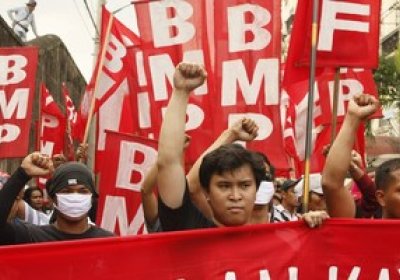There are plenty examples of sporting “droughts”, but there has never been a more harrowing athletic drought — rife with pain, pathos and perseverance — quite like that of the Palestinian national football team.
This is a national team without a recognised nation to call home; a national team that has never qualified for a major international tournament; a national team that, like its people, struggles to be seen. That drought, 86 years in the making, is now over.
International solidarity
“Riot police were on standby as tens of thousands took to the streets in Madrid, Barcelona and other cities across Spain on Monday to demand a vote on whether to rid Spain of its royal family,” Al Jazeera reported on June 3.
The US House of Representatives disregarded regional consensus on May 28 by voting to impose sanctions against Venezuela.
The vote by acclamation was overwhelming, despite a last-ditch appeal by Michigan’s John Conyers and 13 other progressive Democrats who opposed sanctions and called for restoration of diplomatic relations between the two nations.
They pointed out that regional bodies, including the Organisation of American States, the Caribbean Community and the Union of South American Nations (UNASUR), had all rejected the case for sanctions.
The first Free West Papua campaign office in Australia was opened in April in Perth, signalling the growing international campaign for West Papuan self-determination. West Papua has been occupied by Indonesia since the 1960s, despite an ongoing struggle for independence.
Benny Wenda, a leader of Free West Papua living in exile, said he hoped the Australian government would withstand pressure from Indonesia over the office opening.
It seems to have been decided that the best response to the success of Nigel Farage, the leader of the UK Independence Party that won 27.45% of the vote in the May European elections, is to try to copy him.
The Tories will soon reveal that one of their councillors declared that “the shape of a Romanian’s spine proves he’s actually a type of stinging nettle” on an election leaflet, but it was a mistake anyone could make, especially as the councillor had an earache at the time.
Sixty years ago, in June 1954, a CIA-orchestrated coup ousted the reformist Guatemalan government of Jacobo Arbenz Guzman. The coup installed a brutal right-wing regime and decades of bloody repression.
This event, so notorious in the annals of US imperialism, also Guevara. For it was in the Central American nation, where Guevara's Latin American road trip culminated, that the strands of his early thought Marxism, anti-imperialism, indigenismo were fused in a dramatic, galvanising moment.
Why would the victim of a brutal military dictatorship appoint someone accused of covering up the regime’s crimes as ambassador to the country in which she once sought exile?
This is the question many Chileans are asking after the new government of President Michelle Bachelet named James Sinclair as Chile’s highest diplomatic representative in Australia.
In response, several groups have begun organising a campaign against the appointment.
The European parliamentary poll on May 25 was dominated by the victories of the xenophobic and racist National Front (FN) in France (26%, 24 Members of the European Parliament) and the United Kingdom Independence Party (UKIP) in Britain (26.8%, 24 MEPs) — triggering a fit of mainstream media angst.
The angst is understandable. Five years after the 2009 European elections, the political basis for the European Commission’s austerity drive has been severely weakened. This has rendered “governance” of the 28-member European Union even more difficult.
Far right strengthens
Venezuela and Palestine have signed fresh agreements on oil, taxation and diplomatic cooperation, Venezuela Analysis said on May 19. The agreements were made during a visit by Palestinian president Mahmoud Abbas to Venezuela.
In a key agreement, Venezuela created a new corporation, Petro-Palestina, through which Venezuelan state oil company PDVSA will send oil to Palestine at a subsidised price. Venezuelan president Nicolas Maduro committed to sending an initial shipment of 240,000 barrels of oil.
Sonny Melencio is chairperson of the Filipino Party of the Labouring Masses (PLM) and a former council member of Solidarity of Filipino Workers (BMP).
Melencio is also involved in a new coalition against the established “political dynasties” in the Philippines, called Alliance for Truth, Integrity and Nationalism (ATIN).
The statement below was released by several Asian socialist groups on May 23 in opposition to the military coup in Thailand. To add the name of your group, email int.psm@gmail.com, cc international@socialist-alliance.org. You can see the updated list of signatories at here.
* * *
We, the undersigned organisations, strongly condemn the latest coup d’etat staged by the Thai military under the leadership of Prayuth Chan-ocha.
Bolivian indigenous group the National Council of Ayllus and Markas of Qullasuyu (CONAMAQ) made headlines this year with its threats to blockade the Dakar rally when it passed through Bolivia's highlands region.
This was not the first time that the group caught the attention of the world’s media. Leaders of CONAMAQ have been regularly quoted in the media due to their outspoken criticism of the government of president Evo Morales ― Bolivia's first indigenous head of state.
The articles frequently describe CONAMAQ as “the main indigenous organisation in Bolivia's highlands”.
- Previous page
- Page 157
- Next page







